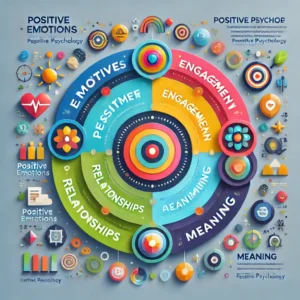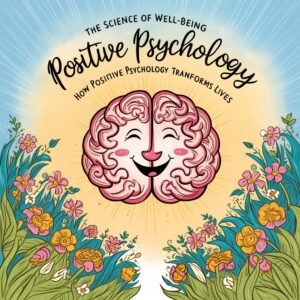“The Science of Well-being: How Positive Psychology Transforms Lives”:
The Science of Well-being: How Positive Psychology Transforms Lives
In today’s fast-paced world, finding happiness and maintaining overall well-being can feel like an uphill battle. We often think of happiness as something elusive—something we chase, but rarely catch. However, there’s good news! The field of positive psychology has been uncovering the secrets to lasting well-being through research-backed techniques that anyone can apply.
But what exactly is positive psychology? It’s a branch of psychology focused not on treating mental illness but on helping individuals thrive, fostering happiness, and living more meaningful lives. It’s about harnessing the science of happiness to transform the way we experience life.
In this post, we’ll dive into how positive psychology can unlock your potential for long-term well-being and happiness, and share practical tips you can use today to make a difference.
What Makes Positive Psychology Different?
Traditional psychology often deals with diagnosing and treating mental health conditions. But positive psychology flips the script by asking a different question: What makes life worth living? Instead of focusing on what’s wrong, it explores how we can enhance our emotional health, build resilience, and live more fulfilling lives.
One of the pioneers of positive psychology, Dr. Martin Seligman, identified key elements that contribute to a life well-lived: positive emotions, engagement, relationships, meaning, and accomplishment (often referred to as the PERMA model).
Let’s break down these components to understand how they work and how you can apply them to your life.
The Science Behind Well-being: Key Components
Researchers have identified several key aspects of well-being that can help us lead happier, more fulfilled lives:
1. Positive Emotions
Positive emotions are the cornerstone of happiness, but they’re about more than just feeling good. Emotions like joy, gratitude, and hope boost mental health and increase our capacity to deal with life’s challenges. Experiencing these emotions regularly helps us be more open, creative, and even more resilient in tough times.
Action Tip: Try keeping a gratitude journal. Each day, jot down a few things you’re grateful for, no matter how small. Over time, you’ll train your mind to focus on the good, which naturally boosts positive emotions.
2. Engagement
Have you ever been so absorbed in an activity that you lost track of time? That’s what positive psychology calls “flow.” When you’re fully engaged in something you love or something that challenges you just the right amount, you’re in a state of flow—one of the key drivers of well-being.
Action Tip: Identify activities where you experience flow. Whether it’s a hobby, a work project, or even a deep conversation, try to incorporate more of these experiences into your routine.
3. Relationships
Human beings are social creatures, and positive psychology recognizes that our relationships with others are critical to our happiness. Supportive, meaningful relationships act as a buffer against stress and increase our overall sense of well-being.
Action Tip: Make time to strengthen your connections. A simple phone call, a thoughtful text, or spending quality time with loved ones can go a long way in boosting your emotional health.
4. Meaning
Purpose is what gives life depth. Having a sense of meaning—knowing that your actions matter and contribute to something bigger than yourself—can dramatically increase your overall happiness and satisfaction.
Action Tip: Reflect on what gives your life meaning. It might be helping others, pursuing personal growth, or contributing to your community. Once you identify this, find ways to weave it into your daily life.
5. Accomplishment
Achieving personal goals—whether big or small—builds self-worth and gives you a sense of progress. The science of positive psychology shows that regularly experiencing achievement can boost long-term happiness.
Action Tip: Set achievable goals for yourself and celebrate small victories along the way. Breaking larger goals into smaller, actionable steps helps maintain momentum and satisfaction.
How Positive Psychology Techniques Enhance Well-being
While understanding these concepts is important, it’s their practical application that makes a real difference. Here are some simple but effective techniques from positive psychology that you can start using today to transform your life:
1. Gratitude Journaling
Regularly practicing gratitude has been proven to shift your focus from what’s lacking to what you have. Over time, this builds a more positive, resilient mindset.
Action Tip: Every evening, write down three things you’re thankful for. It could be anything from enjoying your morning coffee to having a great conversation with a friend. Practicing gratitude enhances emotional well-being and shifts your mindset toward positivity.
2. Random Acts of Kindness
Giving is one of the quickest ways to boost happiness. Performing small acts of kindness—whether for a stranger or someone close—creates a ripple effect, lifting both your mood and theirs.
Action Tip: Commit to one act of kindness each day. It could be something simple, like holding the door open or giving someone a genuine compliment. These little moments add up to a happier, more connected life.
3. Practicing Optimism
Looking on the bright side doesn’t mean ignoring reality. Instead, it’s about training yourself to find solutions and maintain hope, even in difficult situations. Studies show that positive thinking can significantly improve mental health.
Action Tip: When faced with a challenge, ask yourself, “What’s the best possible outcome?” Visualizing a positive result helps you stay motivated and focused on solutions rather than problems.
4. Mindfulness Meditation
Being present in the moment helps reduce stress and improve focus. Mindfulness meditation, a key practice in positive psychology, encourages you to observe your thoughts and feelings without judgment, enhancing both mental clarity and emotional balance.
Action Tip: Start with just five minutes of mindful breathing each day. Pay attention to your breath as it flows in and out, and if your mind wanders, gently bring it back. Mindfulness helps reduce anxiety and keeps you grounded.
5. Strengths-Based Activities
People are happier and more successful when they use their strengths. Identifying your personal strengths and using them in daily life is a core concept in positive psychology.
Action Tip: Take a strengths test, like the VIA Character Strengths Survey, to find your top strengths. Then, focus on incorporating these strengths into your work, hobbies, or relationships.
Why Positive Psychology Can Transform Your Life
By incorporating these practices into your daily life, you can experience significant improvements in both mental health and overall well-being. The beauty of positive psychology is that it provides practical, evidence-based tools that help individuals build a happier, more meaningful life over time.
Many people have reported dramatic life changes after adopting these habits. From increased emotional resilience to more fulfilling relationships, the science of well-being offers concrete benefits for those willing to invest in their own happiness.
Conclusion: Take Charge of Your Well-being with Positive Psychology
The journey to well-being doesn’t have to be complicated. Positive psychology offers simple, actionable techniques that can significantly improve your quality of life. By focusing on what makes you happy, engaged, and connected, you can create a foundation for lasting happiness and fulfillment.
Start small—try gratitude journaling, practice mindfulness, or commit to daily acts of kindness. Over time, these positive habits will reshape the way you see the world and improve your mental health, emotional balance, and overall sense of well-being.
The science is clear: Happiness isn’t a fleeting feeling—it’s a skill that can be cultivated. With the tools of positive psychology, you have everything you need to start transforming your life today.






